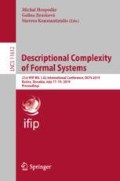Abstract
We study relationships of monotone well quasiorders to regular languages and \(\omega \)-languages, concentrating on decidability of the lattices of upper sets on words and infinite words. We establish rather general sufficient conditions for decidability. Applying these conditions to concrete natural monotone WQOs, we obtain new decidability results and new proofs of some known results.
M. Ogawa—This research was partially supported by Japan Society for the Promotion of Science (JSPS), Core-to-Core Program (A. Advanced Research Networks).
V. Selivanov—The research of V. Selivanov was supported by Russian Science Foundation, project 18-11-00100.
Access this chapter
Tax calculation will be finalised at checkout
Purchases are for personal use only
References
Davey, B.A., Priestley, H.A.: Introduction to Lattices and Order. Cambridge (1994)
Ehrenfeucht, A., Haussler, D., Rozenberg, G.: On regularity of context-free languages. Theor. Comput. Sci. 27, 311–332 (1983)
Glaßer, C., Schmitz, H.: The boolean structure of dot-depth one. J. Autom. Lang. Comb. 6(4), 437–452 (2001). https://doi.org/10.25596/jalc-2001-437
Glaßer, C., Schmitz, H., Selivanov, V.L.: Efficient algorithms for membership in boolean hierarchies of regular languages. Theor. Comput. Sci. 646(C), 86–108 (2016). https://doi.org/10.1016/j.tcs.2016.07.017
Higman, G.: Ordering by divisibility in abstract algebras. Proc. Lond. Math. Soc. s3–2(1), 326–336 (1952). https://doi.org/10.1112/plms/s3-2.1.326
Kříž, I., Thomas, R.: Ordinal types in ramsey theory and well-partial-ordering theory. In: Neše tř il, J., Rödl, V. (eds.) Mathematics of Ramsey Theory. Algorithms and Combinatorics, vol. 5. Springer, Heidelberg (1990). https://doi.org/10.1007/978-3-642-72905-8_7
Laver, R.: Better-quasi-orderings and a class of trees. In: Studies in foundations and combinatorics, Advances in mathematics: Supplementary studies, vol. 1, pp. 31–48. Academic Press (1978)
de Luca, A., Varricchio, S.: Finiteness and Regularity in Semigroups and Formal Languages. Monographs in Theoretical Computer Science. Springer, Heidelberg (1999). https://doi.org/10.1007/978-3-642-59849-4
Marcone, A.: Foundations of BQO theory. Trans. AMS 345(2), 641–660 (1994)
Marcone, A.: Fine analysis of the quasi-orderings on the power set. Order 18(4), 339–347 (2001). https://doi.org/10.1023/A:1013952225669
Nash-Williams, C.S.J.A.: On well-quasi-ordering transfinite sequences. Math. Proc. Cambridge Philos. Soc. 61, 33–39 (1965)
Ogawa, M.: Well-quasi-orders and regular omega-languages. Theor. Comput. Sci. 324(1), 55–60 (2004). https://doi.org/10.1016/j.tcs.2004.03.052
Perrin, D., Pin, J.: Infinite Words, Pure and Applied Mathematics, vol. 141 (2004)
Pin, J.: Positive varieties and infinite words. In: Lucchesi, C.L., Moura, A.V. (eds.) LATIN 1998. LNCS, vol. 1380, pp. 76–87. Springer, Heidelberg (1998). https://doi.org/10.1007/BFb0054312
Rado, R.: Partial well-ordering of sets of vectors. Mathematika 1, 89–95 (1954)
Rogers Jr., H.: Theory of recursive functions and effective computability. McGraw-Hill, New York (1967)
Selivanov, V.L.: A logical approach to decidability of hierarchies of regular star—free languages. In: Ferreira, A., Reichel, H. (eds.) STACS 2001. LNCS, vol. 2010, pp. 539–550. Springer, Heidelberg (2001). https://doi.org/10.1007/3-540-44693-1_47
Selivanov, V.L.: Hierarchies and reducibilities on regular languages related to modulo counting. RAIRO Theor. Inform. Appl. 43(1), 95–132 (2009)
Thomas, W.: Automata on infinite objects. In: Handbook of Theoretical Computer Science, vol. B, pp. 133–192. Elsevier Science Publishers (1990)
Author information
Authors and Affiliations
Corresponding author
Editor information
Editors and Affiliations
Rights and permissions
Copyright information
© 2019 IFIP International Federation for Information Processing
About this paper
Cite this paper
Ogawa, M., Selivanov, V. (2019). On Classes of Regular Languages Related to Monotone WQOs. In: Hospodár, M., Jirásková, G., Konstantinidis, S. (eds) Descriptional Complexity of Formal Systems. DCFS 2019. Lecture Notes in Computer Science(), vol 11612. Springer, Cham. https://doi.org/10.1007/978-3-030-23247-4_18
Download citation
DOI: https://doi.org/10.1007/978-3-030-23247-4_18
Published:
Publisher Name: Springer, Cham
Print ISBN: 978-3-030-23246-7
Online ISBN: 978-3-030-23247-4
eBook Packages: Computer ScienceComputer Science (R0)


